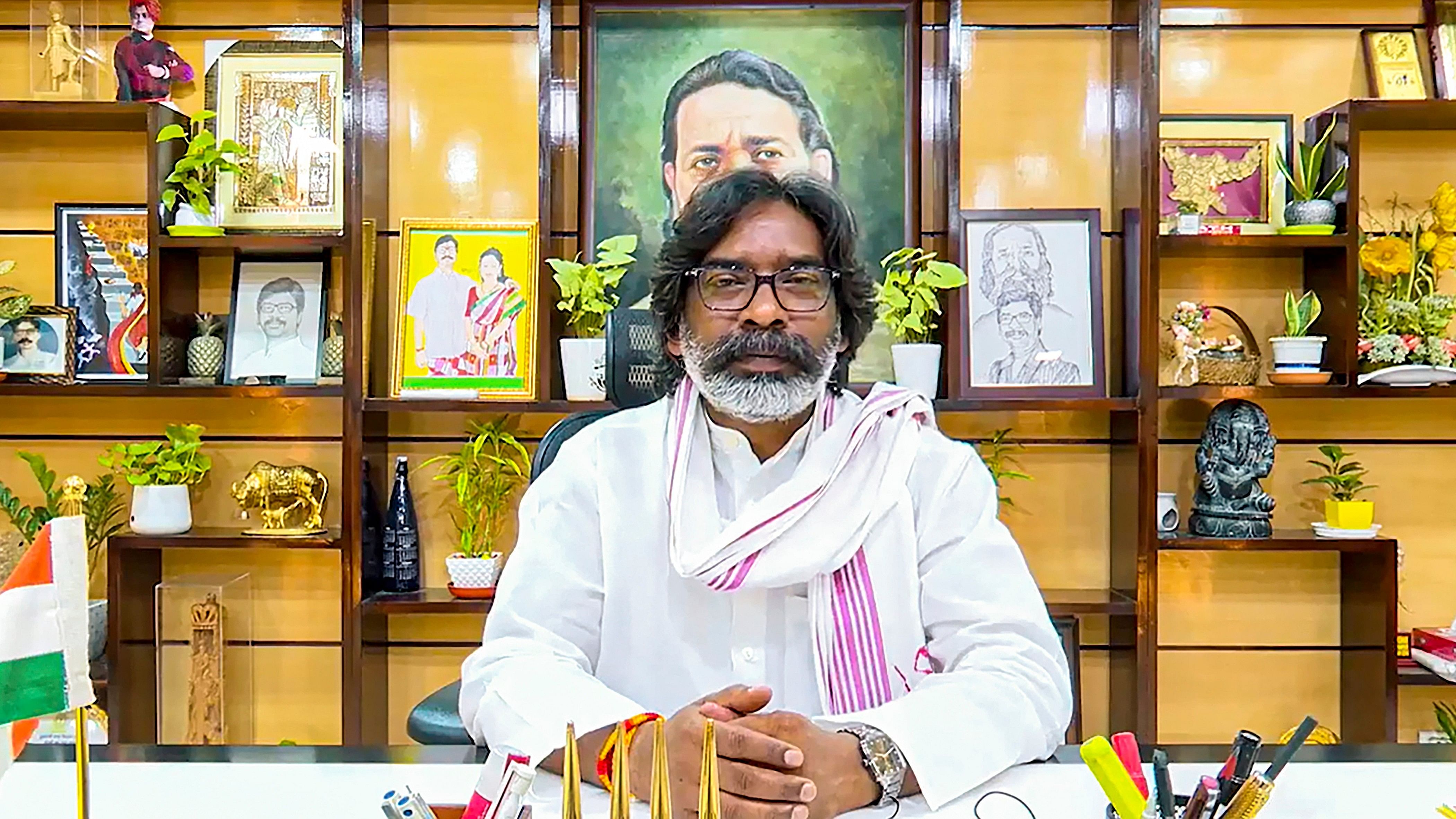
JMM leader and Jharkhand Chief Minister Hemant Soren.
Credit: PTI Photo
Ranchi: From taking charge of Jharkhand as its youngest chief minister at 38 to establishing himself as a "fighter" for tribal rights, Hemant Soren, who returned at the helm for a third term days after his release from jail on bail, has had a chequered career.
Not the first choice of his father Jharkhand Mukti Morcha (JMM) supremo Shibu Soren for inheriting his political legacy, Hemant was groomed in politics after his elder brother Durga died of suspected kidney failure in 2009.
Hemant Soren was released from jail on June 28 after nearly five months, after the Jharkhand High Court granted him bail in a money laundering case linked to an alleged land scam. He had resigned as the CM shortly before his arrest on January 31.
Born on August 10, 1975, in Nemra village near Hazaribag, Soren did his intermediate from Patna High School and later joined Birla Institute of Technology, Mesra in Ranchi, but dropped out.
Known for his love of badminton, bicycles and books, Hemant has two children with his wife Kalpana.
Soren debuted as a Rajya Sabha member in 2009. Next year, he resigned from the Upper House of Parliament to take up the post of deputy chief minister in the BJP-led Arjun Munda government.
Two years later, the BJP-JMM government collapsed and the president's rule was imposed in the state.
In 2013, he took charge of the state as its youngest chief minister, with the support of the Congress and the RJD.
Soren’s first stint as chief minister, however, was short-lived as the BJP seized power in 2014 and Raghubar Das became chief minister. He went on to become the leader of the opposition.
In 2016, when the BJP-led government tried to amend the Chotanagpur Tenancy Act and Santhal Pargana Tenancy Act to allow leasing out of tribal land for non-agricultural purposes, Soren led a massive agitation that paid him dividends three years later.
With the support of his allies Congress and RJD, he came to power in 2019. His party, JMM, alone won 30 assembly seats, its highest tally ever in the 81-member House.
After spending around five months in jail in a money laundering case, the JMM leader after stepping out of the prison had alleged that he was a victim of a political conspiracy.
"How long will you oppress me, how long will you stop me...We are tribals, we are like seeds, the more you bury it in the ground, it will sprout and become a banyan tree," he posted on X in Hindi.
Soon after his arrest on January 31, he shared a poem on social media: "Life is a great battle, I have fought every moment, I will fight every moment but I will not beg for compromise." During his political ascendency, Soren was able to sideline senior JMM leaders such as Stephen Marandi, Simon Marandi and Hemlal Murmu, prompting them to quit the party.
While Murmu and Simon Marandi joined the BJP, Stephen Marandi floated a party along with the first BJP chief minister of the state Babulal Marandi. Later, Stephen returned to the JMM, accepting Soren as the party's leader.
Soren's tenure in the Chief Minister's Office has also not been smooth. In 2022, he was close to disqualification as an MLA, which would have resulted in him losing the CM's post, amidst allegations that a mining lease given to him was renewed after he became the state's chief minister.
That year, three Congress MLAs from the state were also caught with nearly Rs 49 lakh in cash in neighbouring West Bengal. The Soren-led ruling coalition had alleged that they were part of an attempt by the BJP to topple the government.
Amid the political tussle, Soren established himself as a strong voice of the state's dominant tribal community. From ensuring doorstep delivery of services with initiatives such as 'Apke Adhikar, Apki Sarkar, Apke Dwar' to expanding the state government's pension scheme to include more people, social welfare has been a focus area of his regime.
He has also been a strong advocate for the economic benefits of mining activities in the state reaching the tribals.
Soren, now 48, was arrested in a money laundering case linked to alleged land fraud, minutes after he resigned as the chief minister.
He was released after the state high court granted him bail, observing that prima facie he was not guilty, and there was no likelihood of the petitioner committing an offence on bail.